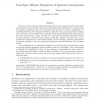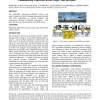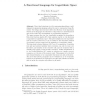6306 search results - page 2 / 1262 » Space, Time, and the Use of Language |
ACL
1994
13 years 6 months ago
1994
This paper shows how to formally characterize language learning in a finite parameter space as a Markov structure, hnportant new language learning results follow directly: explici...
ECCC
2010
13 years 5 months ago
2010
We give two time- and space-efficient simulations of quantum computations with intermediate measurements, one by classical randomized computations with unbounded error and the oth...
CSUR
1999
13 years 5 months ago
1999
The Informedia Experience-on-Demand system uses speech, image, and natural language processing combined with GPS information to capture, integrate, and communicate personal multim...
PLANX
2008
13 years 6 months ago
2008
Motivated by previous work on XML stream processing, we noticed that programmers need concurrency to save space, especially in a lazy language. User-controllable concurrency provi...
APLAS
2004
ACM
13 years 10 months ago
2004
ACM
Abstract. More than being just a tool for expressing algorithms, a welldesigned programming language allows the user to express her ideas efficiently. The design choices however e�...



